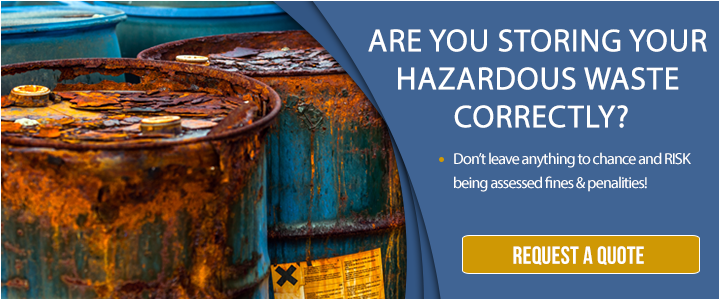Blink and you may have missed it.
If you are a hazardous waste generator, and are not handling your waste streams properly, the cost of doing business has just gone up. SIGNIFICANTLY!!
As of August 1, 2016, the United States Environmental Protection Agency (EPA) has raised the civil penalties for violations of environmental law and EPA regulations. Penalties are being raised to match inflation as mandated under the Federal Civil Penalties Inflation Adjustment Act of 1990.
In some cases, the maximum civil penalties have been raised more 100%.
The EPA maintains a broad range of regulations, covering everything from air emissions and chemical management to pesticides and the storage, handling, treatment, and disposal of hazardous waste.
Federal Civil Penalties Inflation Adjustment Act
 On November 2, 2015, President Barack Obama signed into law the Federal Civil Penalties Inflation Adjustment Act Improvements Act of 2015 (the 2015 Act), which amends the Federal Civil Penalties Inflation Adjustment Act of 1990 (the Inflation Adjustment Act) to improve the effectiveness of civil monetary penalties and to put a significant bite out of offenders.
On November 2, 2015, President Barack Obama signed into law the Federal Civil Penalties Inflation Adjustment Act Improvements Act of 2015 (the 2015 Act), which amends the Federal Civil Penalties Inflation Adjustment Act of 1990 (the Inflation Adjustment Act) to improve the effectiveness of civil monetary penalties and to put a significant bite out of offenders.
The 2015 Act requires federal agencies to:
- Adjust the level of civil monetary penalties with an initial "catch-up" adjustment through an interim final rulemaking (IPR)
Catch-up adjustments will be based on the percent change between the Consumer Price Index for all Urban Consumers (CPI-U) for the month of October in the year of the previous adjustment, and the October 2015 CPI-U.
- Make Subsequent annual adjustments for inflation.
Annual inflation adjustments will be based on the percent change between the October CPI-U preceding the date of the adjustment, and the prior year's October CPI-U. OMB
Agencies were required to publish interim final rules with the initial penalty adjustment amounts by July 1, 2016, and the new penalty levels took effect on August 1, 2016.
These adjustments apply to all civil monetary penalties covered by the Inflation Adjustment Act.
EPA Penalties
EPA oversees a variety of different rules and regulations including the Clean Air Act, the Clean Water Act, the Safe Drinking Water Act (SDWA), the Emergency Planning and Community Right-to-Know Act (EPCRA), the Comprehensive Environmental Response, Compensation, and Liability Act (CERCLA), and the Resource Conservation and Recovery Act of 1976 (RCRA).
For sites subject to the EPA’s Resource and Conservation and Recovery Act (RCRA) hazardous waste rules, the maximum civil penalty will rise from $37,500 per day, per violation to $70,117 per day, per violation, a jump of over 85%.
The maximum civil penalty for violations of the Clean Air Act will rise from $37,500 to $93,750. The maximum penalties under the Clean Water Act will rise from $37,500 to $51,570. In addition, the max fine for violations of the following environmental requirements will rise from $37,500 to $53,907 for SDWA, EPCRA and CERCLA.
Lastly, penalties for violations of the EPA fines chemical management, reporting, and recordkeeping rules under the Toxic Substances Control Act (TSCA) will stay the same, at $37,500. Federal Insecticide Fungicide and Rodenticide Act (FIFRA) penalties will rise from $7,000 to $18,750.
The following table outlines the new fines more clearly.
| Act | Previous | Current |
| Clean Air Act | $37,500 | $93,750 |
| Clean Water Act | $37,500 | $51,570 |
| Federal Insecticide Fungicide and Rodenticide Act | $7,000 | $18,750 |
| Safe Drinking Water Act; Emergency Planning and Community Right-to-Know Act; Comprehensive Environmental Response, Compensation, and Liability Act | $37,500 | $53,907 |
New penalties took effect on August 1, 2016, but will be applied to violations that occurred any time after November 2, 2015.
Types of Enforcement Actions
There are 3 types of enforcement actions the EPA can take to impose fines or seek criminal charges:
- Civil Administrative Actions
- Civil Judicial Actions
- Criminal Actions
1. Civil Administrative Actions are non-judicial enforcement actions taken by EPA or a state under its own authority. These actions do not involve a judicial court process. An administrative action by EPA or a state agency may be in the form of:
- a notice of violation or a Superfund notice letter, or
- an order (either with or without penalties) directing an individual, a business, or other entity to take action to come into compliance, or to clean up a site.
2. Civil Judicial Actions are formal lawsuits. They are filed in court, against persons or entities that have failed to:
- comply with statutory or regulatory requirements,
- comply with an administrative order,
- pay EPA the costs for cleaning up a Superfund site or commit to doing the cleanup work.
These cases are filed by the U.S. Department of Justice on behalf of EPA. In civil cases they are typically filed by the State's Attorneys General on behalf of the states.
3. Criminal Actions can occur when EPA or a state enforce against a company or person through a criminal action. Criminal actions are usually reserved for the most serious violations, those that are willful, or knowingly committed. A court conviction can result in fines or imprisonment. (Source EPA)
Cost of Business Rising
EPA notes that the increased maximum monetary fines will not necessarily change the amount of penalty they will seek under their civil penalty policy, which considers case-specific factors such as seriousness of the violation, good faith compliance efforts, economic benefit gained from a violation, and ability to pay.
There is no question, however, that the new penalty amounts authorize the agency to significantly increase proposed fines and penalties.
Resolving enforcement matters under the new penalty provisions undoubtedly will become more costly and challenging.
It is important that hazardous waste generators maintain strict RCRA compliance. A licensed and experienced hazardous waste generator is the first line of defense. To understand your requirements and the most common violations, download a copy of our eBook “The Top 10 Hazardous Waste Violations and How to Avoid Them.”
Featured Image Credit: Photo by Joe Gratz | CC BY
Image Credit: Photo by The White House | USGW


Comment